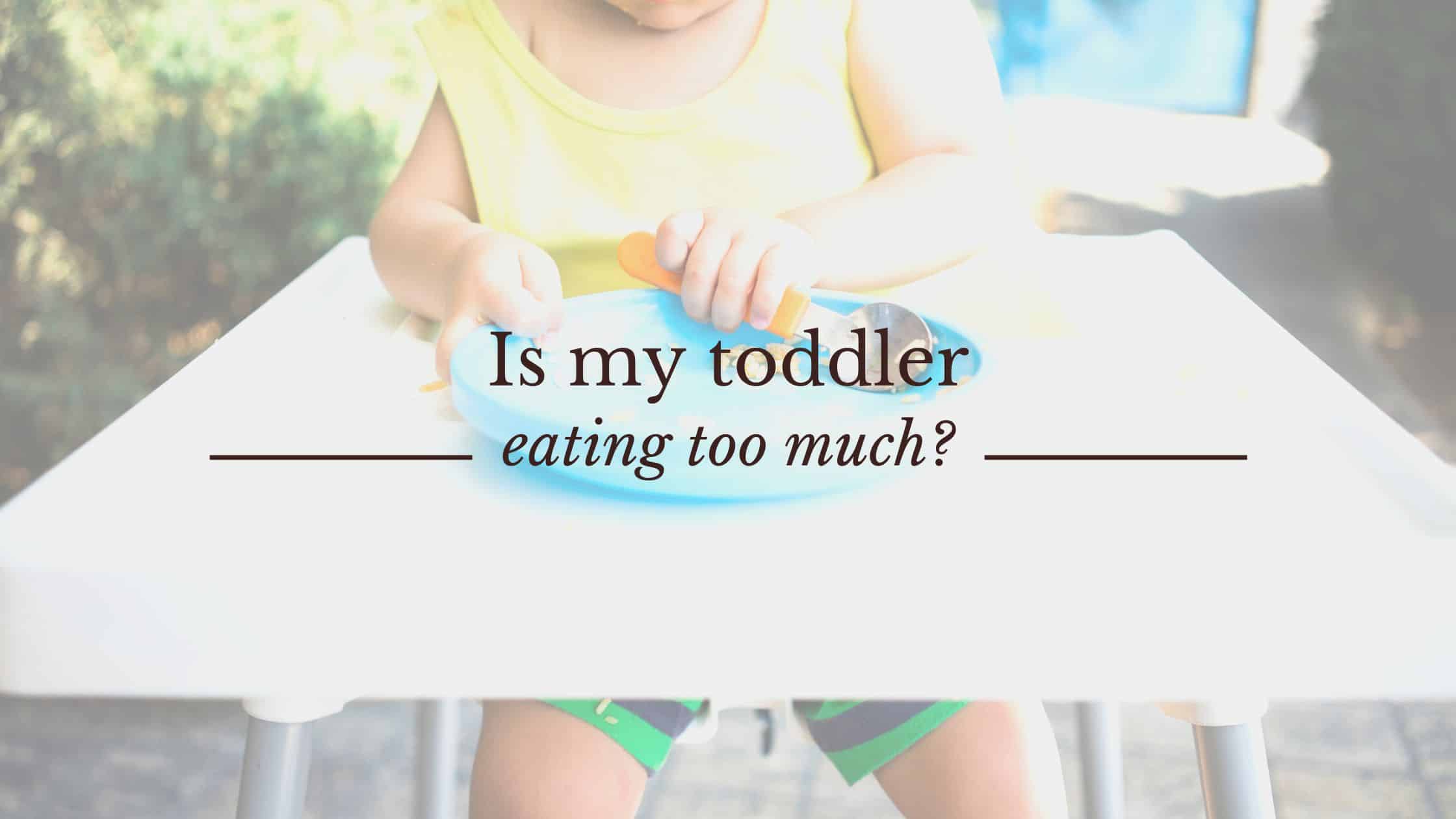
Help, my toddler is eating too much!
Your toddler shovels back three portions of lunch and is asking for more. He’s in size four clothing…yet only two years old. It seems like he’s eating too much and gaining too much weight. Should you be worried?
Some parents think their child (of any age) is eating too much food, and others think their child is not eating enough. How do you know, and what do you do about it?! Read on to find out.
Can I trust my child’s appetite?
Yes, you can trust your child’s appetite. Your child is the only one who knows if they’re hungry. Children are the best regulators of their appetites. Some days (or weeks), they seem to survive on air! On other days they could eat and eat and eat.
Children’s appetite depends significantly on their growth rates, teething, illness, physical activity etc. You learned quickly after having a baby that they go through massive growth spurts! And if your child has a week or a few days where they aren’t eating much for whatever reason – they will likely double their intake for a few days to make up for it.
Trust that your child is doing what his/her body is requesting. While kids do an excellent job listening to their fullness cues and hunger signals, most adults do not. This is a great skill. We want our children to keep this skill as long as possible and to raise intuitive eaters.
Should I restrict if my child won’t stop eating?
This goes back to the Division of Responsibility. Parents are responsible for the following:
–when the child is offered food: at regular meals and snack times vs constant snacking after a year of age
–where the food is offered: at a supportive seat with a footrest, at the family table, ideally with other family members.
–what food is offered to eat: most often balanced meals include a variety of food groups, including at least one food your child likes if they’re a picky eater.
And the child’s job in eating is to choose if or how much to eat. Sometimes this includes zero bites. Sometimes it includes four portions.
There’s a practical part to this too. If your child wants never-ending blueberries at snack time, maybe you’ve actually run out of blueberries! Or do we need to make sure everyone has blueberries? Or you need to save some for a recipe. Offer more of another food to fill up on, if your child is still hungry,
Usually, it will become apparent they are going through a growth spurt if food intake increases for a few days. It’s rare a child will overeat to the point of getting sick. But it can happen. Likely, it will only happen once!
It’s better than the consequences of regularly restricting food…
Dangers of Food Restriction
Restricting the amount of food your child eats does not promote a healthy relationship with food or their body. Instead, it leads to binge eating, weight gain, shame and guilt around food.
Your child may react by over-eating when they get the chance if you have been restricting the amount of food your child is allowed to eat at scheduled meals & snack times. And these opportunities increase as your child ages.
By restricting food, you also restrict the necessary vitamins and minerals the growing body needs. Restricting these vitamins and minerals puts your child at risk for other health conditions.
And when your child doesn’t trust their body to tell them when and how much food to eat, they can eventually develop eating disorders.
Sadly, I often see mothers worried about their child’s weight and food intake when they have an unhealthy relationship with food. Because if you can’t trust your own body – how can you trust your child’s?
It’s important not to pass this unhealthy body image onto your child. And the first step to change is awareness. Is your relationship with food negatively affecting how you feed your child? If so, I would encourage you to seek the support of an intuitive eating dietitian.
Why your toddler might be eating too much
While kids rarely eat more than they need, there are some reasons why this may actually be happening.
Remember the Feeding Relationship rules. The only role of the child is to determine how much or if they eat what they are offered. If you restrict their portions (of the food you choose at set meal and snack times) – you may cause binge eating.
So enforcing a ‘no-seconds’ policy at your dinner table may backfire. Your child may overeat whenever they get the chance if they are typically limited at home.
If you have been consoling, rewarding or bribing with food in the past, that can also lead to emotional eating. We want to keep food neutral, and these tactics make it forbidden and comforting. Check out my three tips to raising a child with a healthy relationship with food for more information.
Also, if you have no set snack schedule and your child can toddle over to the fridge or pantry and help themselves- they may just be eating for something to do! Remember, when the child is offered food is also your role.
Like adults, children feel more confident and secure when their daily activities are predictable and familiar. Children with regular routines have better self-regulation skills which can help create healthy eating habits.
The habit of drinking all the time counts too! If your child is drinking milk or juice all day long, they’re taking in a constant source of calories that may not be as filling as foods.
Is my child actually overweight?
People come in all shapes, and weight is not the best indicator of health. If you offer your child mostly healthy foods at regular times, in the portions they choose, they will get the food and nutrition they need to grow to their healthy weight.
We often misunderstand growth charts. The fiftieth percentile is not the goal. If your child was born on the 95th percentile and continues to grow along that growth curve- it’s likely their healthy weight.
In the rare case of a sharp increase in weight gain for your child, your health professional can help decide if it’s due to an underlying health issue. Otherwise, it’s likely due to the behavioural reasons we discussed above.
If you’re worried about your child’s weight, check out Ellyn Satter’s handout: Your Child’s Weight. Or her book “Your Child’s Weight, Helping without Harming” is an excellent resource.
I love her quote, which sums this topic up nicely: “You don’t have to try to control what and how much your child eats . . . and you don’t have to try to get her to control it, either. She will naturally eat as much as she needs.”
So if you’re following your roles in feeding and letting your child follow theirs, you can offer that third portion of lunch without worry.
Founder of First Step Nutrition | Registered Dietitian Nutritionist
Jen believes raising happy, well-nourished eaters who have a healthy relationship with food doesn't have to be a battle! She is an author and speaker with 18 years of experience specializing in family nutrition and helps parents teach their kids to try new foods without yelling, tricking, or bribing.







No Comments